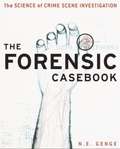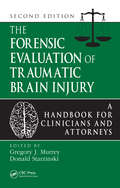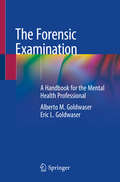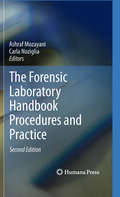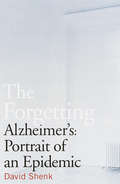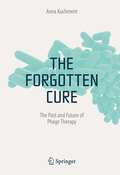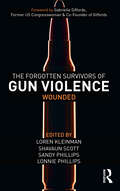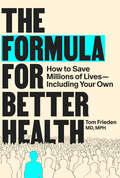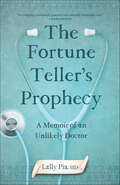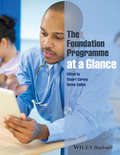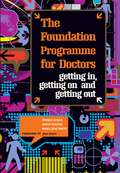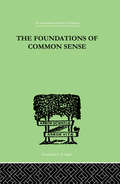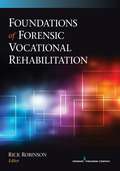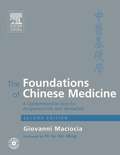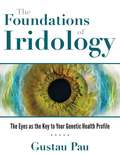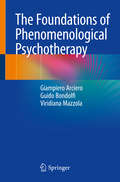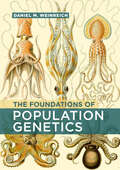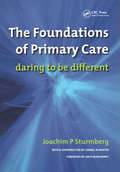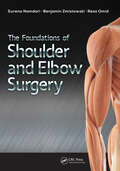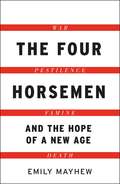- Table View
- List View
The Forensic Casebook: The Science of Crime Scene Investigation
by N. E. GengeTHE ULTIMATE READERS' GUIDE TO THE ART OF FORENSICS! An intrepid investigator crawls through miles of air conditioning ducts to capture the implicating fibers of a suspect's wool jacket . . . A forensic entomologist discovers insects in the grill of a car and nails down a drug dealer's precise geographical path . . . A gluttonous criminal's fingerprints are lifted from a chocolate truffle. . . . Filled with these and many other intriguing true stories, and packed with black and white illustrations and photographs, The Forensic Casebook draws on interviews with police personnel and forensic scientists--including animal examiners, botanists, zoologists, firearms specialists, and autoposists--to uncover the vast and detailed underworkings of criminal investigation. Encyclopedic in scope, this riveting, authoritative book leaves no aspect of forensic science untouched, covering such fascinating topics as:* Securing a crime scene* Identifying blood splatter patterns* Collecting fingerprints--and feet, lip, and ear prints* Interpreting the stages of a body's decay* Examining hair and fiber evidence* Trace evidence from firearms and explosives* "Lifting" DNA prints* Computer crime and forensic photography* Career paths in criminal scienceLucidly written and spiked with real crime stories, The Forensic Casebook exposes the nitty gritty that other books only touch upon. Here is a reference book as addictive as a page-turning novel of suspense.From the Trade Paperback edition.
The Forensic Evaluation of Traumatic Brain Injury: A Handbook for Clinicians and Attorneys, Second Edition
by Donald Starzinski Gregory J. MurreyDrawing on the expertise of several well-known figures in the medical, neuropsychological, and legal professions, Forensic Evaluation of Traumatic Brain Injury: A Handbook for Clinicians and Attorneys, Second Edition provides a concise, general overview of the forensic assessment process and the issues surrounding Traumatic Brain Injury (TBI). The
The Forensic Examination and Interpretation of Tool Marks
by David Baldwin Owen Facey John Birkett Gilleon RabeyThe Forensic Examination and Interpretation of Tool Marks brings together key techniques and developments in the field of tool marks in forensic science and explains clearly how tool mark analysis can be used within forensic investigation.The purpose of this book is to bring together as much of this information as possible in an accessible manner. The book deals with all aspects of tool mark evidence from crime scene to courtroom. The examination of a wide variety of different tool marks are discussed, including those made by specific tools such as saws and in complex materials such as bone.The general principles and techniques used in tool mark examinations can also be applied to some other closely related fields. Therefore, sections on the examination of manufacturing marks, including those on plastic film items, and physical fit comparisons are also included. The book will be of interest to a wide range of people and not just to tool mark examiners and people studying forensic science. It will be of use to crime scene examiners, officers investigating crimes where tool marks are found and members of the legal professions.Brings together key techniques and developments within the field of tool mark investigation.Includes material on examining tool marks at the crime scene and in the laboratory, interpretation and evaluation issues and how tool mark evidence should be presented in court.Covers specialized tool mark examinations, manufacturing marks, including those on plastic film items, and physical fits.Includes a large range of illustrations and photographs.Invaluable reference for practicing forensic scientists, students of forensic sciences, members of the legal professions and crime scene investigators, enabling them to recognise the importance of tool marks within an investigation.An extremely valuable resource in the on-going debate regarding the evidential value of tool marks in court.Part of the 'Essentials in Forensic Science' book series.
The Forensic Examination: A Handbook for the Mental Health Professional
by Alberto M. Goldwaser Eric L. GoldwaserThis book prepares the mental health professional to use scientific skills when working within a legal framework. Written by a seasoned forensic psychiatrist with decades of experience and professional honors, this text answers some of the most challenging questions psychiatrists face when mental health intersects with the courtroom. The text is supported with 34 case vignettes that demonstrate ways in which seemingly simple diagnoses have unique layers of complexities that are vital within the legal system. The resource covers topics that may not be elucidated in medical schools, including what to expect from an expert witness, how to communicate with attorneys who lack a medical background, managing opposing viewpoints, psychiatric and medical malpractice, harassment, employment status, and other difficult topics as it pertains to the law. The text also knits this understanding of forensic psychiatry with clinical knowledge, addressing violence and risk assessment, discrimination, disability evaluation, psychiatric disorders, criminal and civil competence, end-of-life care and decisions, and a wide array of medical topics that have unique concerns when placed in the context of the legal system.The Forensic Examination is a vital resource for psychiatrists, psychologists, criminal and civil defenders, and all professionals working with persons in the medicolegal system.
The Forensic Laboratory Handbook Procedures and Practice
by Ashraf Mozayani Carla NozigliaForensic science has come a long way in the past ten years. It is much more in-depth and much broader in scope, and the information gleaned from any evidence yields so much more information than it had in the past because of incredible advances in analytic instruments and crucial procedures at both the crime scene and in the lab. Many practices have gone digital, a concept not even fathomed ten years ago. And from the first collection of evidence to its lab analysis and interpretation to its final presentation in court, ethics has become an overriding guiding principle. That's why this new edition of this classic handbook is indispensable. The Forensic Laboratory Handbook Procedures and Practice includes thirteen new chapters written by real-life practitioners who are experts in the field. It covers the tried and true topics of fingerprints, trace evidence, chemistry, biology, explosives and arson, forensic anthropology, forensic pathology, forensic documents, firearms and toolmarks. This text also addresses an array of new topics including accreditation, certification, ethics, and how insects and bugs can assist in determining many facts including a margin of time of death. In the attempt to offer a complete and comprehensive analysis The Forensic Laboratory Handbook Procedures and Practice also includes a chapter discussing the design of a laboratory. In addition, each chapter contains educational requirements needed for the discipline it covers. Complete with questions at the end of each chapter, brief author bios and real crime scene photos, this text has risen to greet the many new challenges and issues that face today's forensic crime practitioners.
The Forever Assignment
by Jennifer TaylorYesterday, today and always... Now that Dr. Kasey Harris is part of the team, the Worlds Together aid unit is complete and ready for their assignment. The only problem is, the head of the team is gorgeous, arrogant surgeon Adam Chandler--and Adam and Kasey have met before.... Once deeply in love with her, Adam has never quite forgotten Kasey--nor forgiven her for ending their affair. As they work together under intense pressure, Kasey begins to realize that throwing away his love was the worst mistake of her life. Now, if they can put the past behind them, they could be together...forever
The Forgetting: Alzheimer's: Portrait of an Epidemic
by David ShenkNATIONAL BESTSELLERA powerfully engaging, scrupulously researched, and deeply empathetic narrative of the history of Alzheimer&’s disease, how it affects us, and the search for a cure.Afflicting nearly half of all people over the age of 85, Alzheimer&’s disease kills nearly 100,000 Americans a year as it insidiously robs them of their memory and wreaks havoc on the lives of their loved ones. It was once minimized and misunderstood as forgetfulness in the elderly, but Alzheimer&’s is now at the forefront of many medical and scientific agendas, for as the world&’s population ages, the disease will touch the lives of virtually everyone. David Shenk movingly captures the disease&’s impact on its victims and their families, and he looks back through history, explaining how Alzheimer&’s most likely afflicted such figures as Jonathan Swift, Ralph Waldo Emerson, and Willem de Kooning. The result is a searing and graceful account of Alzheimer&’s disease, offering a sobering, compassionate, and ultimately encouraging portrait.
The Forgotten Cure
by Anna KuchmentThis book fills a void. Never before has a comprehensive history of phage therapy--a once-neglected, now resurgent field--been written. Kuchment writes from the perspective of the eager student of history for the common reader.
The Forgotten Letters of Esther Durrant: The new gripping and heartbreaking historical novel from the bestselling author of The Botanist's Daughter
by Kayte Nunn'I loved this exquisitely written novel and drank in every word. The Forgotten Letters of Esther Durrant is a reminder of the redemptive nature of love, and that it can be found in the most unexpected places.' Fiona Valpy, bestselling author of The Dressmaker's Gift and The Beekeeper's PromiseAn abandoned woman...1951. Esther Durrant, a young mother, is committed to an asylum by her husband. Run by a pioneering psychiatrist, the hospital is at first Esther's prison - but can captivity lead to freedom?A forbidden love...2018. When free-spirited marine scientist Rachel Parker is forced to take shelter on an isolated island off the Cornish Coast during a research posting, she discovers a collection of hidden love letters. Captivated by their passion and tenderness, Rachel is determined to find the intended recipient. A dangerous secret...Meanwhile, in London, Eve is helping her grandmother write her memoirs. When she is contacted by Rachel, it sets in motion a chain of events that threatens to reveal secrets kept buried for more than sixty years. Three women bound together by a heartbreaking secret. A love story that needs to be told.This beautifully haunting and atmospheric novel, will sweep fans of Kate Morton, Elizabeth Gilbert and Emily Gunnis away this summer.'If you enjoyed "City of Girls," by Elizabeth Gilbert, read "The Forgotten Letters of Esther Durrant," by Kayte Nunn' Washington PostNetGalley reviewers are falling in love with The Forgotten Letters of Esther Durrant:'Loved, loved this book. The multi layers wove an intriguing tale, and this was a well researched engaging and heart rending story.''Beautifully written''An absorbing tale set mainly in the Channel Islands. I wanted to know what the resolution would be, so stayed up to read to the end!'Praise for Katye Nunn's The Botanist's Daughter:'A sweeping and exotic read. I was completely swept away. Perfect for readers of Kate Morton.' Lorna Cook, bestselling author of 'The Forgotten Village''The whole book is a delight... Perfect reading whilst sipping a g & t in a beautiful garden somewhere in the sun!' Rosanna Ley, bestselling author of 'The Lemon Tree Hotel''I loved this book and really look forward to reading the next book by Kayte Nunn; perfect for reading in the garden with a glass of something cold.' Bookliterat'Fast-moving and full of surprises...while delivering a poignant and heart-warming story of romance and new beginnings ' Kate Forsyth'The Botanist's Daughter is a quick paced but mysterious read, which transports you across time and place and is filled with an abundance of flowers.' Foreword Books'The Botanist's Daughter is an intriguing story about the strength of women who, for their own reasons, are willing to travel halfway across the world and end up with the same goal. It's also a family mystery that slowly reveals its secrets, just like a blooming flower.' The Bookish Gurl 5/5 stars
The Forgotten Survivors of Gun Violence: Wounded
by Loren Kleinman Shavaun Scott Sandy Phillips Lonnie PhillipsThe toll of America’s gun violence epidemic is usually measured in lives lost—more than 35,000 each year. Ignored, almost completely, are the many more people who are shot every year, and survive. —Shot and Forgotten, The Trace “Nearly 40,000 people die from gun violence in the US every year. This uniquely American crisis leaves no community untouched—but it doesn’t have to be this way.” —Gabrielle Giffords The Forgotten Survivors of Gun Violence collects 20 personal essays of survivors’ visible and invisible wounds from school shootings, attempted suicide by firearm, mass shootings, gang violence, and domestic violence. Their stories remind us that these traumatic experiences are not exclusive to combat soldiers but, more notably, suffered by ordinary people during modern life. With this collection, editors Loren Kleinman, Shavaun Scott, Sandy Phillips and Lonnie Phillips expose the true lifecycle of a bullet and the trauma left in its wake. Through personal narratives and select personal photos, the wounded tell a story that’s forgotten when the cameras go away. This collection will be of interest to first responders, officers, therapists, medical practitioners, and educators.
The Formation of the Swiss Hospital System (1840–1960): An Analysis of Surgeon-Modernisers in the Canton of Vaud
by Pierre-Yves DonzéThis book offers an analysis of the formation of contemporary hospital systems between the mid-19th century and the mid-20th century. Based on extensive archival material and a broad international literature review, it focuses on the case of the canton of Vaud, Switzerland, and uses a triple approach that discusses technological innovations, hospital management, and health policy. This research is a major contribution to the history of medicine which gives a unique overview of the formation of contemporary hospital systems.
The Formula for Better Health: How to Save Millions of Lives--Including Your Own
by Tom FriedenThe formula to stop invisible killers—an approach that can protect your health and prevent the next pandemic—from one of the most influential public health leaders in the US.In The Formula for Better Health, Tom Frieden—named &“the most influential leader in American public health since C. Everett Koop&” by former Mayor Michael Bloomberg—reveals how to defeat the world&’s deadliest diseases.Drawing from decades leading New York City&’s health department after 9/11, directing the CDC during the Ebola epidemic, and fighting tuberculosis and other lethal threats in India and around the world, Frieden combines compelling stories with insider knowledge to show you how to win the battle for health.In this book, you will step into laboratories that solve mysteries and expose deadly deceptions. You&’ll meet a trailblazing epidemiologist who survived a Nazi concentration camp, a seventeenth-century cloth merchant who discovered public health&’s superpower, and a brilliant Irish doctor knighted for unlocking the cure for tuberculosis. You&’ll also learn how disease detectives ended the largest outbreak of drug-resistant tuberculosis in the United States, what caused the deadliest mistake during the COVID pandemic, and why we ignore urgent medical warnings. Most importantly, you&’ll find out how to stop today&’s leading killers.Using critical insights from real-world successes and failures, The Formula for Better Health bridges the lethal gap between scientific knowledge and life-saving action. Whether you want to protect your own health, safeguard your community, or solve seemingly impossible health challenges—or all three—this book offers realistic hope and a clear path to a healthier future.
The Fortunate Adversities of William Bligh
by Roy SchreiberWilliam Bligh is best known as the cause of the mutiny on the Bounty. He was also the victim of two other mutinies. Yet when he died he was a vice-admiral of the British navy. How was that possible? If ever a person learned to profit from adversity, it was William Bligh.
The Fortune Teller's Prophecy: A Memoir of an Unlikely Doctor
by Lally PiaWhen a military coup in Ghana leads to the abrupt closure of Lally Pia’s medical school, she is left stranded there, thousands of miles away from her family in California, with no educational prospects or money. Adding to her turmoil is her discovery that her American Green Card has been botched, which means she has no country to call home. But a Sri Lankan priest told Lally that she would one day become a “Doctor of Doctors” —and she is intent on proving him right. This sizzling multicultural roller coaster illustrates the power of self-determination as Lally, a young immigrant with a drive to succeed, takes on obstacle after obstacle—an abusive relationship, the welfare state, and a gruesome job where she has to dismember human bodies—in order to fulfill her dreams. A story that will resonate with anyone who has faced cultural and immigration hardships, The Fortune Teller’s Prophecy is a nail-biting journey across continents, through hardships, and into ultimate triumph.
The Foundation Programme at a Glance
by Derek Galen Stuart CarneyProviding an overview of the formative years of a junior doctor's career, The Foundation Programme at a Glance consolidates the generic and condition-specific skills required to excel in this stage of training. Taking a simple and holistic approach to providing support for junior doctors, it integrates text and image content to suit all learning styles.Sections include advice on making the most of your training, tips on good clinical practice, communication, and common presentations and conditions. Edited by the National Director and Deputy National Director of the UK Foundation Programme, each section is written by experts in their respective fields, presenting insights into the programme with unrivalled authority.The Foundation Programme at a Glance:* Uses diagrams, line drawings and flow charts to clearly illustrate concepts* Follows the current Foundation Programme curriculum* Integrates theory and practiceThis comprehensive and practical volume contains all the vital information you need to reach excellence during the foundation years, and to get the most out of your time on the programme.
The Foundation Programme for Doctors: Getting in, Getting on and Getting Out (Radcliffe Ser.)
by Ferras Alwan Rohin Francis Emma Jane SmithThis book includes a foreword by Jane Dacre, Academic Vice President, Royal College of Physicians, Professor of Medical Education, CHIME, Royal Free and University College Medical School, University College London, Consultant Physician and Rheumatologist, The Whittington Hospital, London. This book prepares you for the often daunting life after medical school, detailing everything you need to know about preparing, applying and surviving. It's the most up-to-date guide available filling you in on recent important changes to the application system. This practical guide is full of valuable tips, tables, worked examples, frequently asked questions, further resources and useful addresses. Highly recommended for final year medical students and other clinical medical students preparing for their final year, this book is also invaluable for junior doctors progressing through the Foundation Programme and all those with teaching and supervisory responsibilities in medical schools and hospitals. 'An invaluable resource for our new generation of doctors. It takes readers through the process from application, to F2 and beyond. It offers useful advice in a useable and readable format. It is written by a group of current and past medical students who have lived through, and continue to live through, the insecurities of the changing medical career structures. Its style is informal, engaging and easy to absorb, so it should be a good distraction for those currently in the run-up to their finals exams. Good luck to all of you, and don't forget, Medicine is a wonderful career.' - Jane Dacre, in the Foreword.
The Foundations Of Common Sense: A PSYCHOLOGICAL PREFACE TO THE PROBLEMS OF KNOWLEDGE (International Library Of Psychology Ser.)
by Isaacs, NathanFirst Published in 1999. Routledge is an imprint of Taylor & Francis, an informa company.
The Foundations Of Forensic Vocational Rehabilitation
by Rick RobinsonThis is the first fundamental text to focus specifically on forensic vocational rehabilitation, a field that is forecast to grow rapidly. Forensic vocational rehabilitation consultants evaluate the vocational and rehabilitation needs of individuals in an array of legal settings such as civil litigation, workersí compensation, Social Security disability, and others. The text is unique in its exploration of the vocational rehabilitation process from a biopsychosocial perspective that views disability as a complex and multidimensional construct. The book comprehensively describes the parameters and theoretical issues of relevance in evaluating and developing opinions in forensically oriented matters. It culls and synthesizes current peer-reviewed literature and research on this private subspecialty practice area of rehabilitation counseling, including theories, models, methods, procedures, and fundamental tenets of the field. Also included is current information about the labor market, life care planning, and professional identity, standards, and ethics.
The Foundations of Chinese Medicine: A Comprehensive Text for Acupuncturists & Herbalists
by Giovanni Maciocia Su Xin MingThis successful Chinese medicine textbook covers the theory of traditional Chinese medicine and acupuncture, and discusses in detail the use of acupuncture points and the principles of treatment. The material is based on rigorous reference to ancient and modern Chinese texts, and explains the application of theory in a Western practice context. The new edition features new and updated material, including discussion of 50 additional acupuncture points and more patterns. A redesigned layout complements the accessible writing style and makes the material even easier to follow.
The Foundations of Iridology: The Eyes as the Key to Your Genetic Health Profile
by Gustau PauA complete guide to decoding the iris to reveal health predispositions for prevention and early treatment • Details the fundamental reflex signs of iridology and how to identify constitutional strengths and weaknesses in the stroma, pigments, and capillaries of the eyes as well as read energy patterns in pupil tone • Explores the history and development of iridology from the 18th century to today • Includes analysis of real case studies with full-color photos and illustrations The iris of your eye is a personal and unique identifier that expresses much more about us than we can imagine. Through detailed observation of the irises’ stroma, pigments, and capillaries, you can determine a person’s constitutional strengths and weaknesses and gain insight into their genetic predisposition to certain illnesses as well as preventive and treatment options that would be most effective. By reading the iris, practitioners of natural medicine can interpret the signs that reveal a client’s lifestyle choices and use this knowledge to make enlightened decisions regarding the client’s health plan and how to help them realize their full potential. In this full-color guide, Gustau Pau, an iridologist with more than 35 years of experience, details the chromatic scale and signs expressed in the eyes and how to use them to identify organs and their function as well as susceptibility to specific ailments. He explores the history and development of iridology from Hildegard von Bingen’s work on healing to 18th-century European scientists, including Ignaz von Peczely, the father of modern iridology. He reveals recent iridology developments on identifying genetically inherited physical traits, explaining how individuals can use this insight to make nutritional and lifestyle choices that will offset inherited weaknesses and bolster strengths. Focusing on the digestive system, he shows how the pupillary zone can reveal digestive function and demonstrates how diet is responsible for causing many diseases. The author also explores miasmas in the eyes, includes methods for reading energy patterns in pupil tone, and offers the scientific explanation for the old contention that the “eyes are the windows of the soul.” Illustrating the fundamental signs that iridologists use for reference, Pau provides sample iridographies and real case studies with photos and diagrams. Explaining how scientific research on the eye has not yet caught up with the innovations of iridology, he shows how the eyes reveal both our internal state and future health and have a much broader role in the body that we are only now just discovering.
The Foundations of Phenomenological Psychotherapy
by Giampiero Arciero Guido Bondolfi Viridiana MazzolaThis book addresses selected central questions in phenomenological psychology, a discipline that investigates the experience of self that emerges over the course of an individual’s life, while also outlining a new method, the formal indication, as a means of accessing personal experience while remaining faithful to its uniqueness. In phenomenological psychology, the psyche no longer refers to an isolated self that remains unchanged by life’s changing situations, but is rather a phenomenon (ipseity) which manifests itself and constantly takes form over the course of a person’s unique existence. Thus, the formal indication allows us to study the way in which ipseity relates to the world in different situations, in a way that holds different meanings for different people. Based on this new approach, phenomenological psychotherapy marks a transition from a mode of grasping the truth about oneself through reflection, to a mode of accessing the disclosure of self through a work of self-transformation (the care of self) that requires the person to actually change her position on herself.By putting forward this method, the authors shed new light on the dynamic interplay between a person’s historicity and uniqueness on the one hand, and the related physiopathological mechanisms on the other, providing evidence from the fields of genetics, cardiology, the neurosciences and psychiatry. The book will appeal to a broad readership, from psychiatrists, psychologist and psychotherapists, to researchers in these fields.
The Foundations of Population Genetics
by Daniel M. WeinreichAn accessible but rigorous treatment of the theoretical foundations of population genetics.Population genetics—the branch of evolutionary biology concerned with understanding how and why populations&’ genetic compositions change over time—rests on a well-developed theoretical foundation that draws on genetics, mathematics, and computer science. This textbook provides an approachable but rigorous treatment for advanced undergraduate and graduate students interested in building a quantitative understanding of the genetics of evolution. Existing texts either assume very mathematically advanced readers, or avoid much of the underlying theory, instead focusing on current methods of data analysis. In contrast, The Foundations of Population Genetics develops the theory from first principles. Requiring only confidence in algebra, this self-contained, student-friendly book illustrates the conceptual framework, terminology, and methods of mathematical modeling. It progressively introduces concepts from genetics as needed, while emphasizing biological implications throughout. As a result, readers come away with a deep understanding of the structure of population genetics without needing to master its mathematics.Connects theory with the most recent genetic data better than existing textsFeatures engaging real-world examples and extensive original figuresProvides dozens of carefully scaffolded questions that deepen the reader's understanding of key conceptsIdeal as a succinct reference for established scientists in biology, medicine, and computer scienceInstructor resources available
The Foundations of Primary Care: v. 1, Satisfaction or Resentment? (Radcliffe Ser.)
by Joachim P. Sturmberg James DearmanThis work contains foreword by Ian R McWhinney, Emeritus Professor of General Practice, Schulich School of Medicine and Dentistry, Centre for Studies in Family Medicine University of Western Ontario, Canada. This ground-breaking book encourages a re-focus on the subjective and social nature of health and illness. It helps healthcare professionals find fresh perspectives to assist patients, many of whom are threatened by and lost in a healthcare system dominated by diseases and procedures. The book takes a whole systems approach to primary care, incorporating new developments, social aspects, critical discourse, international perspectives, and the history and philosophy of medicine. It is a stimulating and inspiring read for general practitioners and other primary healthcare professionals, undergraduate and postgraduate medical students, healthcare educators, academics, and primary care researchers. Healthcare policy makers and shapers will value its lucid account of complex issues. 'Joachim Sturmberg has written an important book, which I sincerely hope the reformers of our health care system will study carefully. It is also a riveting read. With great erudition and strong arguments, Sturmberg lays out a plan which leads to a goal to which we all aspire - a health care system based on primary care and primary health care which expresses the historic values of medicine and adapts itself to the complexity of modern medicine. A must read for anyone who has the interests of primary care at heart.' - Ian R McWhinney, in the Foreword.
The Foundations of Shoulder and Elbow Surgery
by Surena Namdari Benjamin Zmistowski Reza OmidA comprehensive introductory text with more than 150 color images and figures, The Foundations of Shoulder and Elbow Surgery provides essential information on shoulder and elbow care for students, residents, fellows, and new doctors.Surgery of the shoulder and elbow has grown more common in recent decades as understanding of anatomy, physiology, and pathology has improved. Additionally, innovations in surgical techniques and implant design have given surgeons the tools to address a higher number of shoulder and elbow pathologies. To adequately care for this increasing patient population, the basics of shoulder and elbow care must be disseminated to those in training.Together with their expert contributors, Drs. Surena Namdari, Benjamin Zmistowski, and Reza Omid explore the foundational concepts of shoulder and elbow surgery, including: Shoulder anatomy and physical examination, shoulder instability, and rotator cuff disease Frozen shoulder (adhesive capsulitis) and injuries to the biceps-labral complex Shoulder arthritis (glenohumeral arthritis), shoulder fractures, and the athlete’s shoulder and elbow Scapular disorders and acromioclavicular disorders Elbow anatomy and physical exam, elbow instability, and tendon injuries Neuropathies of the upper extremity Elbow arthritis, fractures of the elbow, and humeral shaft fractures In conjunction with clinical experience, The Foundations of Shoulder and Elbow Surgery will serve as an invaluable resource for orthopedic surgeons-in-training.
The Four Horsemen
by Emily MayhewThe Four Horsemen - War, Pestilence, Famine and Death - first appeared in the Book of Revelations a thousand years ago, but they continue to track us in our own time. This original and inspiring study bycelebrated historian Emily Mayhew traces the advances in science, technology and humanitarianism that are enabling us to take them on, one by one.'The beauty of The Four Horsemen is how she takes her quaking readers to the edge of the abyss . . . I was left moved and uplifted . . . [A] first-class example of popular science' The Times'[A] thoughtful and ultimately uplifting analysis of the unsung heroes of our age' IndependentIt begins in Mosul, our oldest surviving city, and the extraordinary coalition created in a matter of days to save its people from the worst horrors of the liberation battle against ISIS. As the city and the humanitarian operation that helped it to survive are restructured for a new age, Mayhew shows other people whose work gives us hope for the future, from the search to find new ways to discover and use antimicrobial medicines and the innovations in preventing the spread of deadly viruses; the laboratory work being taken to protect crops from disease and reduce famine, and why the potato, not the banana is the future; to the unique courage and resolution of those dedicated to securing the rights of the dead and their families. Standing in the way of the Horsemen is what Emily Mayhew calls, 'the most extraordinary alliance ever to come together in defence of our humanity.' These are the doctors, scientists, statisticians, engineers, peace negotiators, pharmacists, historians, forensic scientists, vaccinators and volunteers who are creating solutions to life and death problems which threaten us all. They are the new heroes of our age and this book is about them.
